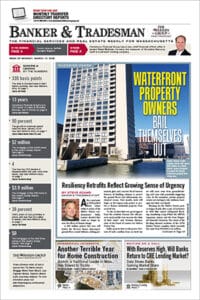
Located near its Somernova innovation campus, Rafi Properties’ newly-completed “tough tech” development at 599 Somerville Ave. has yet to announce any tenant leases. Photo by Steve Adams | Banker & Tradesman Staff
Somerville officials and developer Rafi Properties say upzoning the latter’s big Somernova campus and surrounding commercial properties could stem the exodus of clean energy startups to the suburbs, while adding new protections against displacement of arts and cultural tenants.
But recent signs point to limits on Somerville’s climate tech industry’s expansion potential.
“We weren’t against Somerville by any means,” said Shiv Bhakta, co-founder of solar energy company Active Surfaces, which relocated from Somernova’s Greentown Labs to Woburn after receiving pre-seed funding this year. “We just didn’t see anything that was our size and reasonable from a dollar perspective.”
At 599 Somerville Ave., Rafi Properties’ newly completed 43,200-square-foot “tough tech” development project has yet to announce any tenants, even as Somerville climate tech startups continue to expand in Boston suburbs. And President-elect Donald Trump has vowed to gut the federal Inflation Reduction Act, which delivered subsidies spurring Bay State clean energy companies’ expansion in recent years.
Boston-based Rafi Properties was founded by Collin Yip as a Boston University student in 2011 and acquired the Ames Business Park campus – which later became Somernova – in 2018.
Citing the need to stem an exodus of startups to the suburbs, Rafi Properties submitted a rezoning plan last year that would have allowed 1.6 million square feet of new development on its 7-acre campus. It withdrew the petition days ahead of a City Council vote last winter; in its place, the Mayor’s Office of Strategic Planning & Community Development is leading a new rezoning study for the central Somerville Avenue area.
Rafi Properties did not respond to requests for an interview and did not respond to emailed questions submitted through its public relations firm.

Cummings Properties has successfully lured Greentown Labs graduates to its less expensive suburban properties, like solar energy firm Active Surfaces’ new home at 34 Commerce Way in Woburn. Photo courtesy of Cummings Properties
Woburn Lures Greentown Labs Graduates
A procession of well-funded startups in the city’s thriving climate tech economy have migrated to suburbs north of Boston to find suitable expansion space. Two Greentown Labs graduates, water filtration firm Zwitter and Allium Engineering, relocated to Woburn and Billerica respectively.
In August, Active Surfaces leased 4,800 square feet at Cummings Properties’ 34 Commerce Way in Woburn after receiving $4.5-million in pre-seed funding.
Woburn-based Cummings Properties has assembled a climate tech industry cluster north of Boston in recent years. Approximately 30 clean energy-related companies occupy 500,000 square feet at properties in Woburn and Beverly, comprising about one-sixth of Cummings’ total lab and R&D portfolio, Cummings President Eric Anderson said.
“Proximity to Boston and Cambridge research hubs is important, but we’re able to offer much lower rates here in the suburbs and that makes the larger facilities more affordable,” Anderson said.
Rents for the flex-style industrial spaces average $25 per square foot, representing a steep discount from locations closer to Boston, Cummings Vice President of Leasing John Halsey said.

Citing the need to stem an exodus of startups to the suburbs, Rafi Properties originally submitted a rezoning plan that would have allowed 1.6 million square feet of new development on its 7-acre campus. Image courtesy of Rafi Properties
Somerville Fights for Share of Growth Sector
Climate tech’s recent emergence as a major leasing driver in Greater Boston has been one of the few bright spots in the region’s commercial real estate market since 2022. Multi-million-dollar funding awards from venture capital firms and the federal Inflation Reduction Act alike prompted early-stage companies to lease expansion space, primarily north and west of Boston.
As Somerville seeks to expand the climate industry ecosystem from startups to commercialization, city officials are trying to fine-tune recent zoning strategies designed to attract high-end industry while simultaneously preserving the creative economy.
“The fast-growing climate tech industry is vital,” Somerville Mayor Katjana Ballantyne said at the initial public meeting on the rezoning process in late October. “They are bringing development pressures that could intentionally displace artists and makers who call this area home without careful planning.”

Steve Adams
Somerville already has Greater Boston’s most stringent protections for arts and cultural space, noted Ami Bennitt, a founder of the ArtStaysHere coalition which has coordinated campaigns to fight displacement.
In 2019, Somerville added a new zoning requirement requiring at least 5 percent of major developments be set aside for arts and creative enterprises (ACE). The new protections followed the departure of nonprofit Artists Asylum to Allston-Brighton after it was unable to reach a new lease agreement with Rafi Properties.
The latest rezoning proposal requires redevelopments including Somernova to include at least 10 percent ACE square-footage, to replace fabrication studios that would be torn down to make way for the new buildings. And it removes some uses such as co-working from the ACE definition, while adding new categories such as music recording studios.
“We think originally the uses were broad, and some of that did not actually help arts and culture. There are new definitions that will be voted on shortly,” Bennitt said. “What they accomplished in 2019 set the stage for what’s evolving now.”
The Union Square Neighborhood Council is separately negotiating a community benefits agreement with Rafi Properties that would include details on management and operations of the ACE space in a redevelopment, Bennitt said. The agreement would provide arts tenants with legal protections and specify responsibilities for management and operations of the spaces, topics that are outside of the zoning process.
Editor’s note: This report has been updated to correct the current location of Zwitter.





